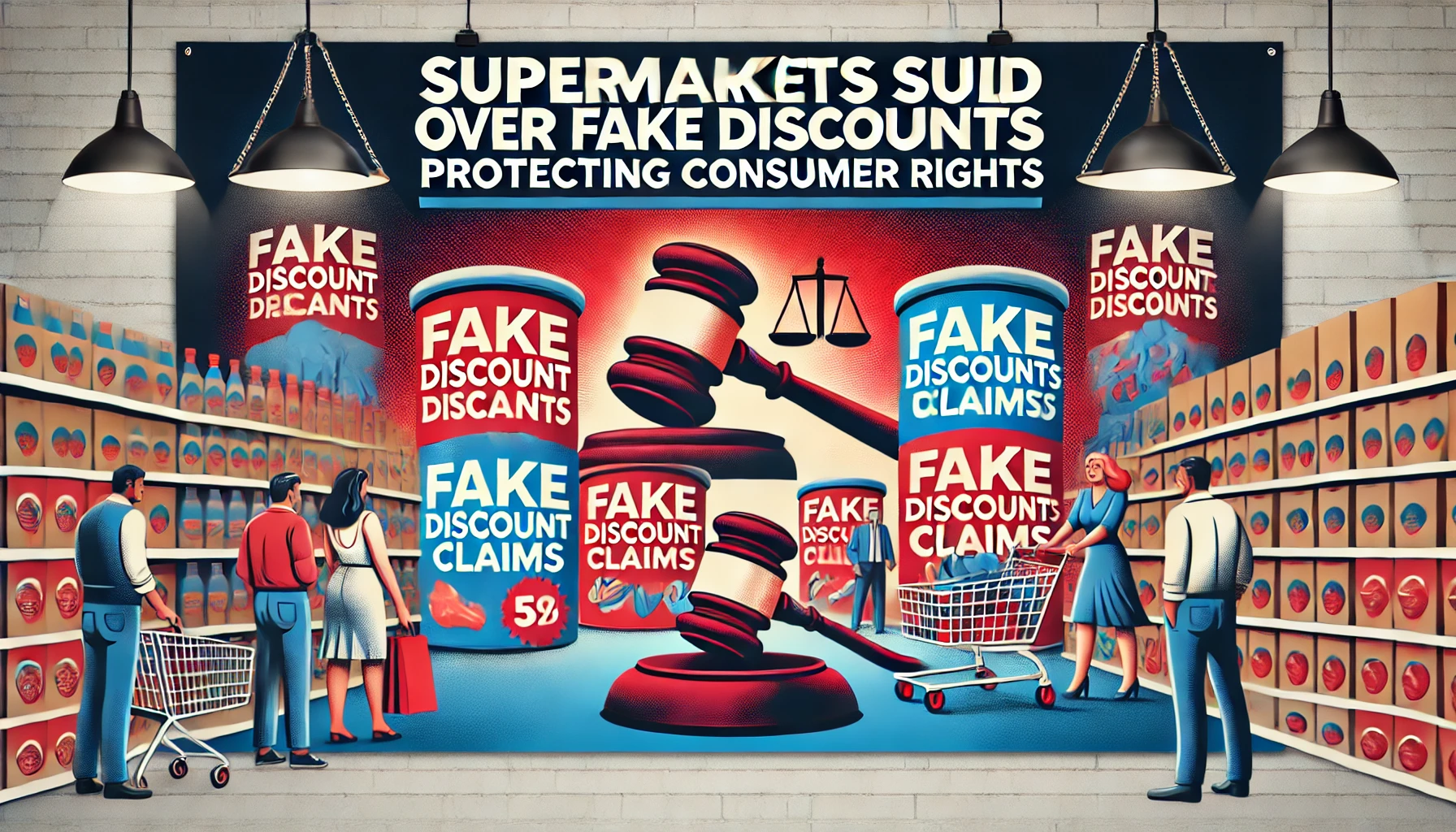Australia Supermarkets Sued Over Fake Discount Claims: What It Means for Retail and Consumers
The retail landscape in Australia has come under scrutiny as major supermarkets face lawsuits over fake discount claims. This growing issue of false advertising not only affects consumer trust but also challenges the integrity of the retail sector. As retailers increasingly use misleading pricing claims to boost sales, consumer protection organizations have ramped up their efforts to hold businesses accountable.
In this blog, we explore the current legal battles involving Australia’s supermarket lawsuits, the implications for consumers, and how the global retail industry is responding to such retail fraud allegations.
Supermarkets Face Lawsuits Over Fake Discounts
In recent years, supermarket lawsuits have become more frequent as consumers and watchdog groups challenge the marketing practices of major retailers. These lawsuits typically center around claims of fake discounts, where supermarkets advertise inflated discounts on products to entice customers. In reality, these discounts may be misleading, as the original prices were artificially inflated just before the sale(AOL.com).
Examples of Recent Lawsuits
- Supermarket A Lawsuit: One prominent case involved a large Australian supermarket chain advertising products as “50% off,” when the original price had only been temporarily raised days before the sale began.
- Supermarket B’s Legal Battle: Another high-profile lawsuit targeted a chain that promoted seasonal discounts, only for customers to realize that the prices were higher than they had been a few months prior.
These examples underscore the growing legal scrutiny around supermarket false advertising and how retail fraud lawsuits are shaping the retail industry.
Understanding Fake Discount Claims and Retailer Discount Fraud
At the heart of these lawsuits is the issue of fake discount claims. Many retailers, not just in Australia, but globally, engage in misleading pricing claims to lure shoppers looking for a bargain. Unfortunately, this practice often violates consumer protection laws and leads to accusations of retailer discount fraud.
What Are Fake Discount Claims?
Fake discount claims occur when retailers advertise a discount or promotion, but the original price used as a reference was artificially inflated. This tactic misleads consumers into believing they are getting a better deal than they actually are. The rise in retailer discount fraud has prompted lawsuits from consumer advocacy groups and individual customers seeking justice(Global Training Center).
Legal Implications for Retailers
Retailers found guilty of making fake discount claims can face substantial fines and damage to their reputations. False advertising lawsuits have become a powerful tool for holding companies accountable. For example:
- Retail fraud lawsuits often result in hefty settlements or court-ordered fines.
- Supermarkets may also face long-term consequences, such as loss of consumer trust and brand credibility.
Australia’s Consumer Protection Laws and Supermarket Lawsuits
Australia has some of the strictest consumer protection laws globally, designed to safeguard buyers from deceptive practices. The country’s legal framework has been instrumental in bringing Australia supermarket lawsuits to the forefront.
Australia Consumer Protection Laws
The Australian Competition and Consumer Commission (ACCC) plays a crucial role in enforcing laws that protect consumers from misleading pricing claims and fake discount claims. The ACCC has the authority to investigate and take legal action against supermarkets and retailers engaged in false advertising(AOL.com).
Key Elements of Consumer Protection in Australia:
- Truth in Pricing: Retailers must accurately display the original and discounted prices of their products. Any manipulation of prices is considered a breach of consumer trust.
- Misleading Conduct: If a retailer promotes a sale or discount in a way that misleads or deceives consumers, they can be sued under Australia’s consumer protection laws.
With increasing awareness of consumer rights, more Australians are coming forward to challenge retailers in court. This has led to a rise in consumer rights lawsuits, holding businesses accountable for their marketing tactics.
Global Impact: What Other Countries Can Learn from Australia
Australia’s proactive stance against supermarket false advertising serves as a model for other countries grappling with similar issues. The legal actions taken in Australia reflect a broader global movement toward transparency and fairness in retail pricing. As more consumers become aware of retailer discount fraud, companies worldwide must adapt or risk facing similar legal challenges.
The Rise of Consumer Rights Lawsuits Worldwide
Beyond Australia, countries like the U.S. and the U.K. are also seeing a rise in false advertising lawsuits. In the U.S., large retailers have been sued for advertising “buy one, get one free” deals that were found to be misleading. Similarly, in the U.K., consumer watchdogs have fined supermarkets for inflating prices ahead of sales events like Black Friday(Supply Chain World magazine).
Lessons for Retailers
Retailers worldwide can learn from the legal battles unfolding in Australia. To avoid retail fraud lawsuits and protect their reputations, companies should:
- Ensure Price Accuracy: Clearly display both the original and discounted prices, and avoid inflating prices before a sale.
- Adopt Transparent Marketing: Be truthful in advertising promotions and discounts to maintain consumer trust and avoid legal repercussions.
- Prioritize Consumer Trust: Long-term relationships with consumers are built on trust, which can be eroded by deceptive pricing practices.
Consumer Rights: How Shoppers Can Protect Themselves from Fake Discounts
With the rise of fake discount claims, consumers must remain vigilant when shopping, especially during sales events. Understanding your rights as a consumer and knowing how to spot misleading pricing claims can protect you from falling victim to retailer discount fraud.
Tips for Identifying Fake Discounts
- Track Prices Over Time: Be mindful of the product’s price history. If a retailer has recently raised the price before advertising a discount, the deal may not be genuine.
- Compare Prices: Use price comparison tools or apps to check if other stores are offering the same product at a lower price without the “discount.”
- Read the Fine Print: Carefully examine the terms and conditions of a sale. Sometimes, the “original price” may not reflect the true market value of the item.
Legal Recourse for Consumers
If you believe you have been misled by fake discount claims, there are several steps you can take:
- Report to Consumer Protection Agencies: In Australia, report the issue to the ACCC or local consumer protection authorities.
- Join a Class Action Lawsuit: In some cases, consumers can join a class action lawsuit against a retailer, seeking compensation for deceptive practices(Global Training Center).
- Seek Legal Advice: Consulting with a lawyer specializing in consumer protection can help you understand your rights and the potential for legal recourse.
The Growing Scrutiny of Supermarket Discount Practices
The rise in supermarket lawsuits over fake discount claims is not just an Australian issue—it reflects a broader concern in the global retail industry. As consumers become more informed and consumer rights lawsuits increase, supermarkets and retailers must prioritize transparency and fairness in their pricing strategies to avoid legal battles and protect their reputations.
For consumers, understanding how misleading pricing claims work and staying informed about consumer protection laws can help prevent falling victim to deceptive marketing. As legal cases against supermarket false advertising continue to grow, the retail sector faces new challenges in maintaining trust while driving sales.
For more insights into consumer protection and legal actions against false advertising, visit Regent Studies for resources and guidance on how to protect your rights as a shopper.
For further reading on consumer lawsuits and retail fraud, check out this detailed article on consumer rights.



